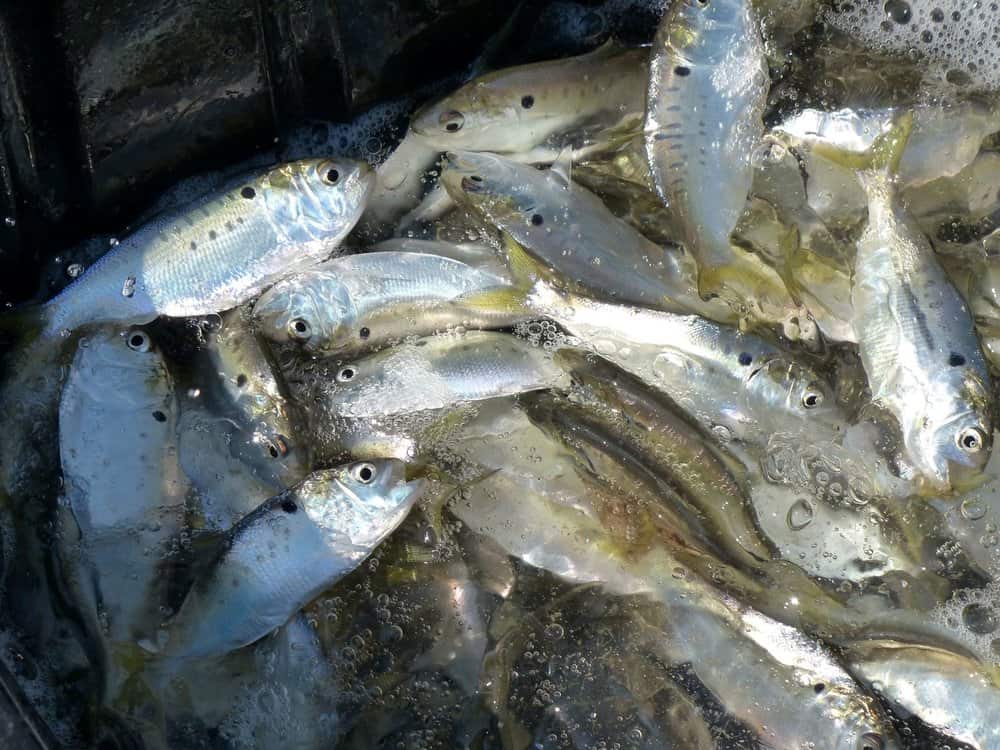A battle over menhaden is underway in the Virginia General Assembly right now.
The oily, stinky fish makes up the biggest commercial fishery by volume on the Atlantic Coast, and more than 70 percent of its harvest is caught in Virginia waters. Menhaden also play a key role in the Chesapeake Bay’s food chain, as prey for sea birds, and bigger fish like rockfish.
The menhaden fishery is the only one regulated by the legislature, instead of the Virginia Marine Resources Commission or the Department of Game and Inland Fisheries. Thus, lawmakers must rewrite current menhaden catch limits in order to stay in compliance with the newest fishery management plan.
The plan, drawn up by the Atlantic States Marine Fisheries Commission (ASMFC) in November, increases the allowable catch for the entire menhaden fishery, but decreases Virginia’s Chesapeake Bay harvest cap to 51,000 metric tons, which is rounded up from the previous five-year average . Read more about the new management plan here.
The bill first introduced in Virginia’s General Assembly this winter got stuck in committee, but Virginia State Delegate Barry Knight has introduced a new bill on behalf of Virginia Governor Ralph Northam, to comply with the ASMFC plan.
In a letter to Delegate Danny Marshall (R-Danville), the Chairman of the House Committee on Agriculture, Chesapeake and Natural Resources, Governor Northam writes, “Increases in stock abundance and relinquishment of quota from other states to Virginia have resulted in an increase of more than 4 million pounds of menhaden for the Commonwealth. Delegate Knight’s new bill reflects that, and does no harm to the menhaden industry.”
If the plan isn’t implemented, Virginia could fall out of compliance with the Interstate Fishery Management Plan, and the state could face a moratorium on all menhaden fishing.
Environmentalists and anglers rallied together in support of the bill implementing the plan:
“As the group that represents recreational anglers and charter boat captains, our businesses depend on menhaden to sustain a healthy population of striped bass, bluefish, and other sport fish,” said John Bello, Chairman of the Virginia Saltwater Sportfishing Association. “Legislators are supporting local businesses when they ensure that Virginia complies with these menhaden fishery regulations.”
The coalition of groups supporting the bill includes the Chesapeake Bay Foundation, Friends of the Rappahannock, James River Association, Lynnhaven River NOW, The Nature Conservancy, Virginia League of Conservation Voters, Virginia Conservation Network, Virginia Eastern Shorekeeper, and Virginia Saltwater Sportfishing Association.
“It’s difficult to overstate the economic or ecological importance of menhaden,” said Nikki Rovner, Associate State Director of The Nature Conservancy in Virginia. “That is why states have to work together. If one state refuses to cooperate, the consequences could be devastating not only for the menhaden population, but also for the other 26 nearshore fish species Virginia co-manages with other states through the ASMFC.”




